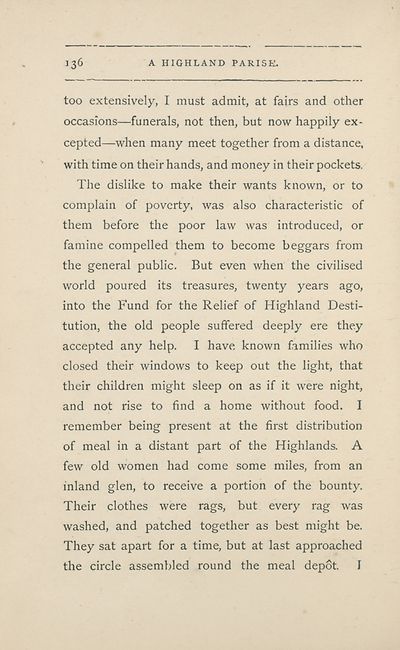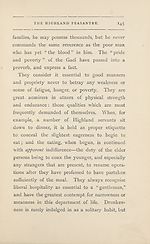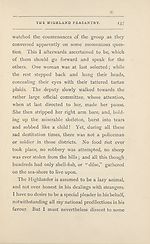Download files
Complete book:
Individual page:
Thumbnail gallery: Grid view | List view

136 A HIGHLAND PARISH.
too extensively, I must admit, at fairs and other
occasions—funerals, not then, but now happily ex¬
cepted—when many meet together from a distance,
with time on their hands, and money in their pockets.
The dislike to make their wants known, or to
complain of poverty, was also characteristic of
them before the poor law was introduced, or
famine compelled them to become beggars from
the general public. But even when the civilised
world poured its treasures, twenty years ago,
into the Fund for the Relief of Highland Desti¬
tution, the old people suffered deeply ere they
accepted any help. I have known families who
closed their windows to keep out the light, that
their children might sleep on as if it were night,
and not rise to find a home without food. I
remember being present at the first distribution
of meal in a distant part of the Highlands. A
few old women had come some miles, from an
inland glen, to receive a portion of the bounty.
Their clothes were rags, but every rag was
washed, and patched together as best might be.
They sat apart for a time, but at last approached
the circle assembled round the meal depot. I
too extensively, I must admit, at fairs and other
occasions—funerals, not then, but now happily ex¬
cepted—when many meet together from a distance,
with time on their hands, and money in their pockets.
The dislike to make their wants known, or to
complain of poverty, was also characteristic of
them before the poor law was introduced, or
famine compelled them to become beggars from
the general public. But even when the civilised
world poured its treasures, twenty years ago,
into the Fund for the Relief of Highland Desti¬
tution, the old people suffered deeply ere they
accepted any help. I have known families who
closed their windows to keep out the light, that
their children might sleep on as if it were night,
and not rise to find a home without food. I
remember being present at the first distribution
of meal in a distant part of the Highlands. A
few old women had come some miles, from an
inland glen, to receive a portion of the bounty.
Their clothes were rags, but every rag was
washed, and patched together as best might be.
They sat apart for a time, but at last approached
the circle assembled round the meal depot. I
Set display mode to:
![]() Universal Viewer |
Universal Viewer | ![]() Mirador |
Large image | Transcription
Mirador |
Large image | Transcription
| Antiquarian books of Scotland > Scotland/Scots > Reminiscences of a Highland parish > (148) |
|---|
| Permanent URL | https://digital.nls.uk/109513226 |
|---|
| Description | Thousands of printed books from the Antiquarian Books of Scotland collection which dates from 1641 to the 1980s. The collection consists of 14,800 books which were published in Scotland or have a Scottish connection, e.g. through the author, printer or owner. Subjects covered include sport, education, diseases, adventure, occupations, Jacobites, politics and religion. Among the 29 languages represented are English, Gaelic, Italian, French, Russian and Swedish. |
|---|

